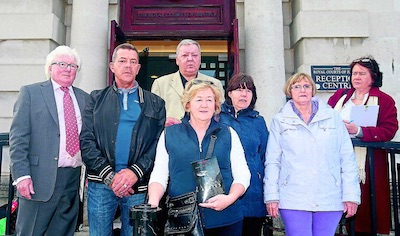
A High Court judge in Belfast has described the activities of a gang in which members of the British Crown forces carried out sectarian murders alongside unionist paramilitaries as “deeply disturbing.”
Justice Seamus Treacey made the remark during a judicial review of the PSNI’s decision not to complete a report into the Glenanne gang by the now defunct Historical Enquiries Team (HET)
The gang is believed to have killed about 120 people, mostly mid-Ulster Catholics, during the 1970s. It was based at a farm in Glenanne, Armagh and is believed to have included members of the RUC (now PSNI) police and the British Army’s former Ulster Defence Regiment.
Up to 90 incidents are under scrutiny. They include atrocities such as the 1975 Miami Showband massacre, where three members of the popular group were taken from their tour bus and shot dead on a country road in Banbridge, County Down, and the Step Inn pub bombing in Keady, County Armagh a year later.
Bereaved relatives packed into the largest of the Royal Courts of Justice in Belfast for the start of a two-day hearing.
Failure to deliver the HET report amounted to a breach of a legitimate expectation and contravened human rights requirements, the court heard.
“Never properly have these links been recognised at an official state level,” said Danny Friedman, barrister for one victims’s family.
Amid details about individual cases, Mr Justice Treacy was told the same British Army sub-machine gun was used to carry out many of the killings.
“What these families need is a product put together by this respondent at this stage to show, on the basis of viewing material that was in the control of the state, what it knows about state agent involvement,” Mr Friedman argued.
The legal challenge against the PSNI chief for the failure to complete a full inquiry and report has been brought by the brother of one schoolboy victim. Patrick Barnard, 13, was one of four people who died in a bomb at the Hillcrest Bar in Dungannon, County Tyrone in March 1976.
With the HET now effectively shut down, Patrick’s brother, Eddie, wants a judge to compel police to complete the full investigation and publish the findings.
Mr Barnard said it saddened him to note that among those in court to listen to proceedings were the grandchildren of the victims. “The pain of this is moving into another generation,” he said.
Sinn Fein’s Cathal Boylan has said he hopes the judicial review will be successful.
“The Glenanne gang was responsible for more than 100 murders, mostly of nationalist civilians, in Armagh and Tyrone, as well as being involved in the Dublin and Monaghan bombings,” he said.
“The British state has continually sought to deny and delay the truth about the role of its armed forces in running murder gangs during the conflict.
“This continuous refusal to take responsibility for its actions is unacceptable and adds to the pain and suffering of the victims.”
![[Irish Republican News]](https://republican-news.org/graphics/title_gifs/rn.gif)
![[Irish Republican News]](https://republican-news.org/graphics/title_gifs/harp.gif)

